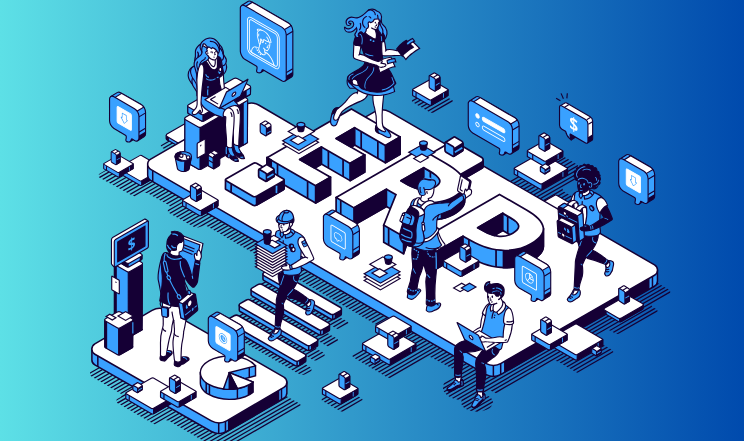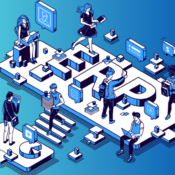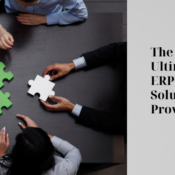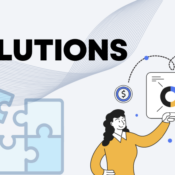Why are ERP solutions important in the education sector?

04/19/2024
/
Why are ERP solutions important in the education sector?
It's a world where every school, college, and university is like a well-oiled machine, running smoothly and efficiently. But what's the secret sauce? It's something called an ERP system, and it's changing the game in how educational places are managed.
So, what's an ERP system? Think of it as a big, smart brain that connects all the different parts of a school. It's like having a super-helper that keeps track of everything from who's enrolled in what class to how much chalk the teachers need and even making sure the bills get paid on time.
Now, you might wonder, why do schools need such a fancy system? Well, running a school is tough work. There are so many things to keep an eye on, and it's very important that nothing slips through the cracks. With an ERP system, schools can make sure everything is ticking along just right, and they can use all the data they collect to make smart decisions.
But it's not always easy. Schools have their own set of tricky puzzles to solve, like making sure all the data from different departments plays nice together, staying on top of all the rules and regulations, and figuring out the best way to use their resources.
The future looks bright for ERP systems in education.
In this blog, we will explore what ERP software is available in the education sector.
Why do educational institutions need ERP?
The need for ERP systems in educational institutions stems from the growing complexity of administrative tasks and the necessity for data-driven decision-making. ERP systems offer:- Centralized Data Management: Before, each school department handled its information, which made it hard to see everything together. Now, ERP systems store all the data in one place, so everyone who needs it can find it easily. This helps with planning and managing resources because you can see what's happening in real-time.
- Streamlined Operations: ERP systems make everyday tasks easier by doing them automatically, like admissions and grading. This reduces the likelihood of errors and expedites the completion of tasks.
- Improved Communication: Good communication is important in schools, and ERP systems help with that too. They provide ways for teachers, students, and parents to talk to each other quickly and easily.
- Enhanced Reporting: ERP systems have tools to make reports and analyze data. This helps schools make better decisions based on facts, like how students are doing or how money is being used.
Implementing ERP in Educational Institutes
Implementing an ERP system in educational institutions is a transformative process that can lead to significant improvements in efficiency and effectiveness. Let’s break down the key steps involved in this process:- Figuring Out What's Needed: First, the school needs to think about what it wants the new system to do. This means looking at what's not working well, what needs to be better, and what goals the new system should help achieve.
- Finding the Right Fit: Next, the school has to pick the right company to provide the new system. It's like finding the right partner—they need to understand what the school needs and be able to provide the right solution. The school also needs to think about things like how much it'll cost and how good the support is.
- Making It Work for Us: Once the system is chosen, it might need some changes to fit the school perfectly. It's a bit like tailoring clothes—the system needs to fit just right. It also needs to work well with any other software the school already uses.
- Teaching Everyone How to Use It: Now, everyone who'll use the new system needs to learn how. Just like learning a new game, staff need to be trained so they can use it well. And if there are any problems, the company that provided the system needs to help fix them.
Modules of ERP Solutions for Educational Institutions
Implementing an Enterprise Resource Planning (ERP) system in an educational institution can greatly streamline administrative tasks, enhance communication, and improve overall efficiency. Some of the best colleges in Delhi NCR are integrating advanced ERP solutions into their operations, revolutionizing administrative efficiency, and enhancing academic excellence. Here are some key modules typically included in ERP systems tailored for educational institutions: Student Information System (SIS):- Student registration and admissions management
- Enrollment management
- Class scheduling and timetable management
- Student records management (grades, attendance, etc.)
- Academic advising and progress tracking
- Faculty information management (personal details, qualifications, etc.)
- Course planning and curriculum management
- Assignment and grading management
- Faculty workload management
- Faculty performance evaluation
- Budgeting and forecasting
- Accounts payable and receivable
- Expense management
- Grants and funding management
- Fee management (tuition fees, scholarships, etc.)
- Employee records management
- Payroll processing
- Attendance tracking
- Recruitment and hiring
- Performance evaluation and management
- Cataloging and inventory management
- Circulation management (issuing, returning, renewing books)
- Online public access catalog (OPAC)
- Acquisition and budget management
- Prospectus distribution and sales
- Application processing
- Entrance exam management
- Interview scheduling
- Admission decision tracking
- Exam scheduling and seating arrangement
- Question paper setting and distribution
- Exam invigilation and supervision
- Result processing and publication
- Transcript generation
- Room allocation and management
- Mess and meal management
- Hostel fee management
- Maintenance and facilities management
- Dashboards for key performance indicators (KPIs)
- Customizable reports for various stakeholders
- Data analysis for decision-making and strategic planning
- Internal messaging system for students, faculty, and staff
- Online discussion forums and collaboration spaces
- Announcement and notification system
- Integration with other systems (e.g., learning management systems, CRM)
- Customization options to adapt the ERP to specific institutional needs
Global Trends in Education ERP
The education sector is embracing a significant digital transformation, and ERP systems are at the heart of this change. These systems are revolutionizing the way educational institutions operate, making them more efficient and responsive to the needs of students and staff. One of the most prominent trends is the shift towards cloud-based ERP solutions. These offer numerous benefits, including the ability to scale resources according to demand, greater flexibility in accessing the system from any location, and cost savings due to the reduced need for on-premises infrastructure. Learning management systems (LMS) are also becoming increasingly popular. They provide a comprehensive platform for managing online learning and course content, which has become especially important in the wake of the COVID-19 pandemic. LMS platforms facilitate remote teaching and learning, allowing institutions to continue their educational activities without interruption. Data analytics is another area where ERP systems are making a significant impact. By analyzing large volumes of data, educational institutions can gain insights into student performance, optimize resource allocation, and make informed decisions about curriculum development and other strategic areas. Finally, Artificial Intelligence (AI) and chatbots are being integrated into ERP systems to automate routine tasks and provide personalized experiences. AI can help tailor the learning process to individual student needs, while chatbots can offer round-the-clock support for common inquiries and issues.ERP in Other Sectors
ERP systems aren't limited to just education; they're a crucial tool used across different industries to boost efficiency and streamline operations. In manufacturing, ERP, like Logway, acts as the central hub, overseeing everything from the supply chain to production on the factory floor, ensuring products are made efficiently and meet quality standards. Retailers use ERP, such as Logway, to handle their large inventories and keep customers happy, while healthcare providers utilize ERP, including Logway Best ERP Solutions, to organize patient records and simplify billing processes.Conclusion
ERP solutions in the education sector are revolutionizing the way institutions operate, offering a path to more efficient, transparent, and effective management. As technology continues to evolve, we can expect ERP systems to become even more integral to the educational landscape, driving innovation and excellence in the sector.Recent Posts
Monika Narriya/0 Comments
Why are ERP solutions important in the education sector?
Monika Narriya/0 Comments
Which is the best ERP solution provider company?
Monika Narriya/0 Comments
How do we select the right ERP solution for our businesses?
Sumit Kumar/0 Comments
9 Most In-Demand Programming Languages for 2024
Sumit Kumar/0 Comments
Best Time to Post on Social Media – 2024 Guide
Sumit Kumar/0 Comments
Why You Should Consider Semantic HTML for SEO
All Categories
- Bing
- Blockchain
- Blog
- Branding
- Case Study
- Content Marketing
- Conversion Rate Optimization
- Cryptocurrency
- Digital Currency
- Digital Marketing
- Email Marketing
- ERP Solutions
- Facebook Marketing
- Google Ads
- Google Updates
- Graphic Designing
- Hire Developers
- Image SEO
- Influencer Marketing
- IT
- Local SEO
- Machine Learning
- Mobile Application Development
- Pay Per Click
- Pinterest SEO
- Podcast Hosting
- React JS
- Reddit & Quora
- Search Engine Optimization
- SEO Copywriting
- Social Media Marketing
- Software
- Software Development
- Technology
- UX and UI
- Web Designs
- Web Hosting
- Website Development
- Website Redesigning
- YouTube SEO








